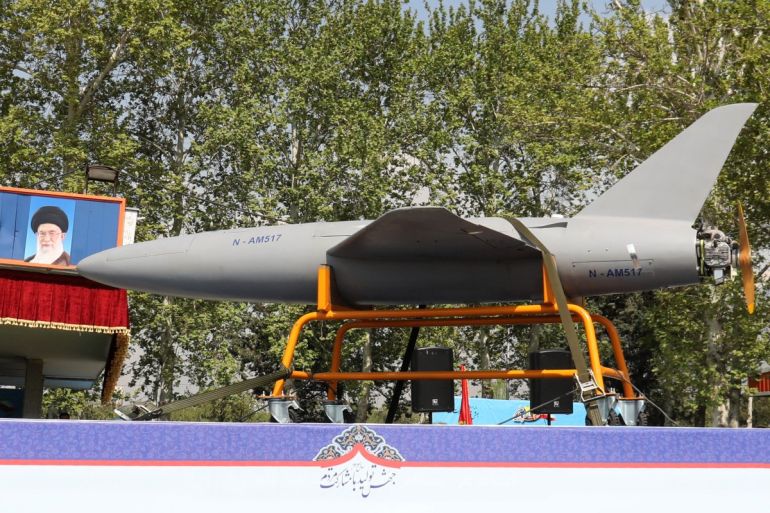US imposes new sanctions on Iran after attack on Israel
Sanctions against Iran’s missile and drone programmes come as fears mount over the possibility of greater regional escalation.

The administration of United States President Joe Biden has imposed new sanctions on Iran in response to its missile and drone attack on Israel, as tensions mount over the possibility of further escalation in the Middle East.
In a statement on Thursday, Biden said the sanctions targeted “leaders and entities connected to the Islamic Revolutionary Guard Corps, Iran’s Defense Ministry, and the Iranian government’s missile and drone program that enabled” the April 13 attack on Israel.
Keep reading
list of 3 itemsIsrael’s response to Iran and the factors that will shape it
What are the implications of Iran’s missile attack on Israel?
“As I discussed with my fellow G7 [Group of Seven] leaders the morning after the attack, we are committed to acting collectively to increase economic pressure on Iran,” the US president said.
“And our allies and partners have or will issue additional sanctions and measures to restrict Iran’s destabilizing military programs.”
Iran launched hundreds of missiles and drones at Israel in the early hours on Sunday, in retaliation for the deadly bombing of the Iranian consulate in Syria’s capital, Damascus, earlier this month.
The attacks came amid months of escalating regional tensions linked to Israel’s months-long bombardment of the Gaza Strip. The war in Gaza has killed more than 33,900 Palestinians and plunged the coastal enclave into a humanitarian crisis.
The Biden administration — which has faced pressure to curb its support for Israel amid the conflict in Gaza — is now facing calls to restrain the Israeli government’s response to Iran’s attack.
Despite an international push for de-escalation, Israeli leaders, including Prime Minister Benjamin Netanyahu, have pledged to respond.
“This is a moment — given the fact we’re looking into the abyss in terms of the region — that Biden has to be much clearer and much stronger in drawing a red line for Israel and Netanyahu not to bring the entire region into a war,” Trita Parsi of the Washington-based Quincy Institute for Responsible Statecraft told Al Jazeera after the Iranian attack.
The sanctions
Thursday’s sanctions targeted 16 people and two entities linked to the production of Iranian unmanned aerial vehicles (UAV), or drones, including models that were used in the Iranian attack against Israel, according to the US Treasury.
Washington also sanctioned five companies that provide materials for steel production in Iran, as well as three subsidiaries of an Iranian automaker accused of offering assistance to Iran’s Islamic Revolutionary Guard Corps (IRGC).
Separately, the US State Department announced that Washington had imposed additional travel restrictions on Iranian Foreign Minister Hossein Amir-Abdollahian, who is in New York to attend meetings at the United Nations.
The minister and his delegation can “move only within a two-bloc radius of the UN headquarter district; between the UN and the Iranian mission to the UN, and the residence of the Iranian permanent representative to the UN; and to John F Kennedy International Airport”, spokesman Vedant Patel told reporters.
But according to David Des Roches, a professor at the National Defense University in Washington, DC, the new US measures will have “minimal” effects.
“These are sort of de minimis actions that the government can take to show they’re doing things,” Des Roches told Al Jazeera. US sanctions against Iran, he added, are “being announced almost on a daily basis”.
“The fact that they’re being publicised a little bit more, I think, is the Biden administration trying to show people — and trying to show Israel’s leadership — that they are taking an active role.”
‘Stop military adventurism’
The US sanctions on Thursday came in coordination with the United Kingdom, which also imposed sanctions on people and entities involved in Iran’s UAV and ballistic missile industries.
In a statement, the British government said it sanctioned the General Staff of Iran’s Armed Forces, the IRGC Navy and individuals affiliated with Iran’s Aerospace Industries Organisation, among other groups and individuals.
“Today we have sanctioned the ringleaders of the Iranian military and forces responsible for the weekend’s attack,” UK Prime Minister Rishi Sunak said.
“These sanctions — announced with the US — show we unequivocally condemn this behaviour, and they will further limit Iran’s ability to destabilise the region.”
But Iran has blamed Israel for the current escalation, stressing that the April 1 attack on its consulate in Damascus violated international law.
During a special UN Security Council session on Thursday, Amir-Abdollahian, the Iranian foreign minister, said Israel “must be compelled to stop any further military adventurism against our interests”.
“In case of any use of force by the Israeli regime and violating [of] our sovereignty, the Islamic Republic of Iran will not hesitate … to assert its inherent rights” to respond, Amir-Abdollahian said.
Earlier in the day, an IRGC official also warned that Iran would attack Israeli nuclear sites and pursue a nuclear weapon should Israel’s government launch strikes against the country’s own nuclear facilities.
“Our fingers are on the trigger of firing strong missiles to destroy the designated targets in response to a potential attack by them,” IRGC Brigadier General Ahmad Haghtalab said, as reported by Tasnim, Iran’s semiofficial news website.